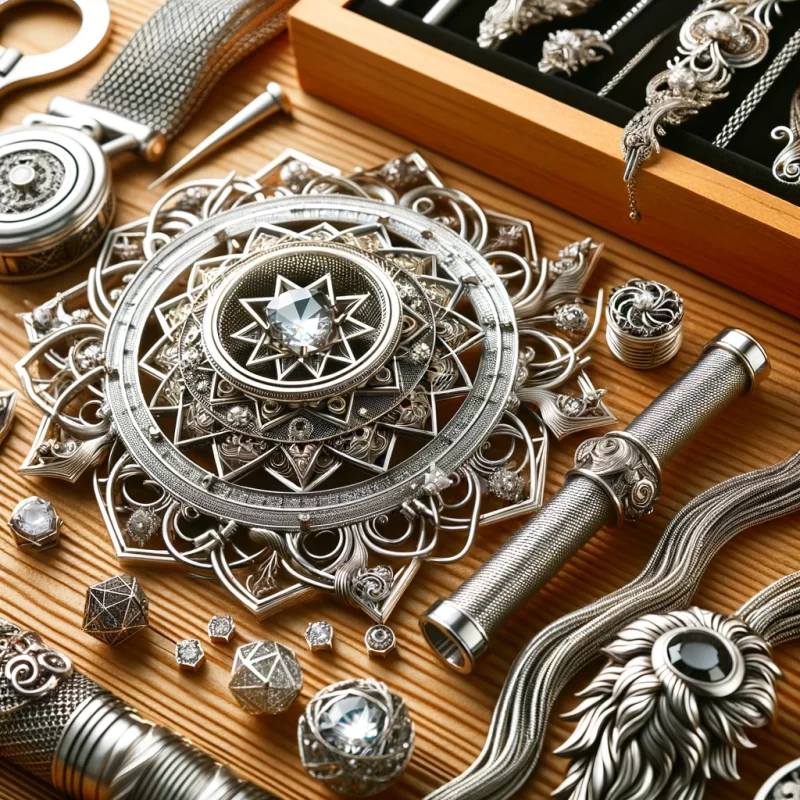Introduction: The Challenges of Bulk Manufacturing
When it comes to stainless steel jewelry manufacturing, delivering large orders on time and with consistent quality is a significant challenge. In this article, I will dive deep into the processes and practices that top manufacturers employ to ensure they meet these challenges head-on.
The Importance of Efficient Production Systems
Efficient production systems are crucial for timely delivery. Most manufacturers integrate advanced planning and scheduling systems to optimize each phase of production. This includes everything from sourcing raw materials to the final assembly and packaging. Manufacturers like Kesheen highlight their use of detailed planning with craftsmen to ensure bulk batches are completed within three weeks.
Quality Control in Manufacturing
Quality control is another cornerstone of successful bulk jewelry manufacturing. This section will explore the specific strategies manufacturers use to maintain quality standards, such as ISO certifications and continuous quality monitoring throughout the production process. For instance, companies like Custom Fashion Jewels emphasize their commitment to continuous quality product delivery through stringent process efficiencies.
Leveraging Technology for Design and Prototyping
The use of technology, especially in design and prototyping, plays a pivotal role. Advanced CAD (Computer-Aided Design) systems and rapid prototyping techniques allow for quick turnarounds on custom designs. Zearrow, for example, offers design consultations within 24 hours and CAD designs in two days, enabling swift development cycles for custom orders.
Logistics and Supply Chain Efficiency
To ensure timely delivery, especially for international clients, stainless steel jewelry manufacturers invest heavily in logistics and supply chain management. Effective supply chain management involves coordinated logistics, robust inventory systems, and reliable shipping partnerships. For instance, companies like Kesheen coordinate with logistics providers to guarantee that delivery schedules are met precisely, reducing delays that can affect large-scale orders.
Transparent and Proactive Communication
Proactive communication with clients is fundamental in managing bulk orders. Manufacturers provide regular updates and are transparent about any potential delays or issues. This communication strategy not only builds trust but also allows for any necessary adjustments to be made promptly. For example, Custom Fashion Jewels emphasize the importance of transparent client relationships to manage expectations and ensure satisfaction with the final product.
Advanced Technologies and Automation in Manufacturing
Leveraging advanced technologies and automation has revolutionized the way stainless steel jewelry is produced. Automation reduces human error, increases production speed, and maintains consistent quality. Technologies such as automated polishing and precision cutting machines ensure that each piece of jewelry meets stringent quality standards before it is shipped. This use of technology underscores the manufacturers’ commitment to quality and efficiency, highlighted by companies like Jusnova, which utilize state-of-the-art manufacturing technologies to streamline production.
Continuous Improvement and Employee Training
A focus on continuous improvement and employee training ensures that quality remains high as production scales. Regular training sessions keep staff updated on the latest jewelry manufacturing techniques and quality standards, which is crucial for maintaining the high standards expected by international clients. The ongoing professional development of employees contributes significantly to the overall quality of the products and the efficiency of production processes.
Sustainable Practices and Corporate Responsibility
Finally, sustainable practices play an increasingly important role in the manufacturing of stainless steel jewelry. Many manufacturers, like Kesheen, have adopted sustainable practices, including recycling stainless steel and using ethically sourced semi-precious stones. These efforts not only appeal to environmentally conscious consumers but also contribute to a more sustainable global jewelry market.
Enhancing Expertise and Experience in Jewelry Manufacturing
Integrating Customer Feedback for Continuous Improvement
A key strategy in ensuring quality and timely delivery in bulk orders is actively integrating customer feedback into the manufacturing process. By listening to client concerns and suggestions, manufacturers can quickly adapt and improve their production lines and end products. This responsiveness not only enhances product quality but also ensures that the products meet the specific needs of clients, establishing a strong foundation of trust and reliability.
Role of Certification in Establishing Authority
Certifications from recognized international standards organizations such as ISO or the Responsible Jewellery Council play a critical role in establishing a manufacturer’s authority in the industry. These certifications are not just accolades; they are proof of a manufacturer’s commitment to maintaining the highest standards of quality and ethical practices. For example, many manufacturers highlight their ISO 9001 certification, which relates to quality management systems and is a critical factor in gaining new business and retaining existing clients.
Implementing Advanced Quality Control Systems
Statistical Process Control in Jewelry Manufacturing
Advanced quality control systems such as Statistical Process Control (SPC) are employed to monitor and control quality during the jewelry manufacturing process. By using SPC, manufacturers can detect and address variances in production before they become issues, ensuring that the final product meets the strict quality standards required by clients. This proactive approach to quality management not only minimizes the risk of defects but also helps in maintaining consistent production output, crucial for large-volume orders.
Leveraging Industry Experience for Enhanced Problem Solving
Experienced manufacturers have a deep understanding of the common challenges in jewelry production, from material sourcing to final assembly. This expertise allows them to anticipate potential problems and implement effective solutions swiftly. Their extensive experience also enables them to offer valuable insights and guidance to clients, particularly when it comes to custom and complex designs, ensuring that client expectations are met or exceeded.
Maintaining Trustworthiness Through Transparent Operations
Openness in Material Sourcing and Production Practices
To foster trust, stainless steel jewelry manufacturers are increasingly transparent about their material sourcing and production practices. This transparency reassures clients about the ethical credentials of their products, particularly important in an era where consumers and businesses alike prioritize sustainability and ethical considerations in their purchasing decisions. By openly sharing information about where materials come from and how products are made, manufacturers strengthen their reputations as trustworthy partners.
Technological Innovations in Stainless Steel Jewelry Manufacturing
Integrating IoT and AI for Enhanced Manufacturing Processes
Innovative technologies such as the Internet of Things and Artificial Intelligence have started to play a significant role in the stainless steel jewelry manufacturing industry. IoT devices collect and analyze data from the production floor in real time, allowing for immediate adjustments to improve efficiency and reduce waste. AI algorithms can predict machine failures and maintenance needs, preventing downtime that could delay large orders. These technologies not only enhance production capabilities but also support manufacturers in their quest to deliver products on time and at the desired quality.
The Rise of 3D Printing in Jewelry Prototyping and Production
3D printing technology has revolutionized prototyping and production in jewelry manufacturing. This technology allows for rapid production of complex designs that would be difficult or impossible to achieve through traditional methods. It significantly reduces the time from design to production, enabling manufacturers to respond quickly to customer requests and market trends. Furthermore, 3D printing minimizes material waste, aligning with sustainable manufacturing practices and appealing to eco-conscious consumers.
Strengthening Customer Relationships Through Personalization
Offering Personalized Design Services
To enhance their authoritativeness and trustworthiness, manufacturers are increasingly offering personalized design services. These services allow clients to be involved in the creation of their unique jewelry pieces, from initial design concepts to the final product. This personalized approach not only improves customer satisfaction but also reinforces the manufacturer’s reputation as a versatile and client-oriented business.
Establishing Robust After-Sales Support
Trustworthy manufacturers understand the importance of robust after-sales support. This includes warranties, easy returns, and responsive customer service. Providing comprehensive after-sales support ensures that any issues clients may encounter are resolved quickly and efficiently, which is essential for maintaining long-term business relationships and building trust.
Conclusion
In the competitive field of stainless steel jewelry manufacturing, success hinges on more than just the ability to deliver large orders on time. It requires a deep commitment to quality, customer satisfaction, and continuous improvement. By leveraging cutting-edge technologies, offering personalized services, and ensuring transparent and ethical operations, manufacturers not only meet but exceed client expectations, thereby fostering lasting relationships and building a strong market presence.



